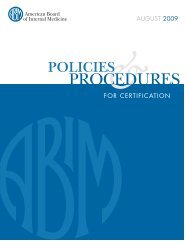The SRA Symposium - College of Medicine
The SRA Symposium - College of Medicine
The SRA Symposium - College of Medicine
Create successful ePaper yourself
Turn your PDF publications into a flip-book with our unique Google optimized e-Paper software.
Relevance to Research Administrators<br />
Behind every successful academic and Institution lies a great research administrator. One definition<br />
<strong>of</strong> a great research administrator is an individual who has the ability to support the research<br />
academic when seeking research funding anywhere in the world. Is that you?<br />
Introduction<br />
As funding for research continues to be a major issue internationally, organisations are seeking<br />
new and more inventive ways <strong>of</strong> securing the necessary resources. This is creating an environment<br />
whereby more and more Universities and Non-pr<strong>of</strong>its are looking further afield, to funders that<br />
they have not considered previously.<br />
In the past, funding streams from the European Commission (EC) were exclusively for Europe, but<br />
under the Framework Programmes 6, and to a greater extent in 7, US collaboration is being actively<br />
encouraged. Likewise for UK Universities and Non-pr<strong>of</strong>its, as our accounting systems change, more<br />
and more collaborative funding opportunities are opening up to us in the United States. So, before<br />
launching ourselves into these new funding pots, what do we need to be aware <strong>of</strong>?<br />
In the UK we have extensive experience in the EC funding environment, but limited experience<br />
with Federal funding. So in May <strong>of</strong> this year, the University <strong>of</strong> Glasgow conducted a study tour <strong>of</strong><br />
three US research active organisations in San Diego (the La Jolla Institute for Allergy & Immunology,<br />
the Burnham Institute and the San Diego State University Foundation), to learn more by<br />
comparing the differences between Federal and European funding, both pre and post award.<br />
This paper is a summary <strong>of</strong> that review, from the perspective <strong>of</strong> the European funding system,<br />
which we hope will be <strong>of</strong> value to our <strong>SRA</strong> colleagues.<br />
Background<br />
As part <strong>of</strong> a new UK Government initiative, UK Universities must adopt an amended Activity<br />
Based Costing (ABC) methodology called Transparent Approach to Costing (TRAC) to determine<br />
the Full Economic Cost (FEC) <strong>of</strong> their activities. In so doing, this aligns our accounting systems,<br />
processes and practices more closely with that <strong>of</strong> our US colleagues. It is worth bearing in mind<br />
that whilst the European Union (EU) has brought about some commonality within its Member<br />
States, the accounting standards, policies and processes are not uniform. Each member country<br />
has its own legislation (similar to State law compared with Federal law), Generally Accepted Accounting<br />
Principles (GAAP) and Accounting Standards.<br />
In order to seek European Commission (EC) funding, US Universities and Non-pr<strong>of</strong>its will need<br />
to collaborate with European organisations, as they cannot bid for this funding directly. Collaboration<br />
<strong>of</strong> this nature also requires adherence to the legal framework <strong>of</strong> the EC (Belgian or Luxembourg<br />
law) and an understanding <strong>of</strong> the different pre and post-award milestones when operating<br />
as a project partner in a European collaborative research project.<br />
Project Costing Methodology<br />
Papers<br />
Universities and Non-pr<strong>of</strong>its have three options under European funding rules when costing their<br />
participation in a European collaborative research project (such as an Integrated Project or a Specific<br />
Targeted Project). <strong>The</strong>se costing options are Additional Cost with indirect flat rate costs (the<br />
AC model), Full Cost with indirect flat rate costs (the FCF model), and Full Cost (the FC model).<br />
Only Universities and Non-pr<strong>of</strong>its, which do not have an accounting system that allows the share <strong>of</strong><br />
their direct and indirect costs relating to the project to be distinguished, may opt for the AC model.<br />
2005 <strong>Symposium</strong> Proceedings Book 173

















